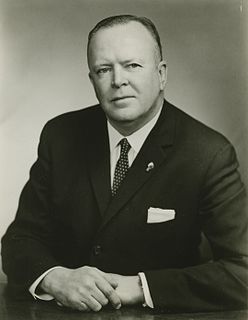A Quote by Irving Fisher
If two parties, instead of being a bank and an individual, were an individual and an individual, they could not inflate the circulating medium by a loan transaction, for the simple reason that the lender could not lend what he didn't have, as banks can do. Only commercial banks and trust companies can lend money that they manufacture by lending it.
Related Quotes
The problems of 2008 were never cured. The Federal Reserve's solution to the crisis was to lend the economy enough money to borrow its way out of debt. It thought that if it could subsidize banks lending homeowners enough money to buy houses from people who are defaulting, then the bank balance sheets would end up okay.
When banks place credits into your account, they are merely pretending to lend you money. In reality, they have nothing to lend. Even the money that non-indebted depositors have placed with them was originally created out of nothing in response to someone else's loan. So what entitles the banks to collect rent on nothing? It is immaterial that men everywhere are forced by law to accept these nothing certificates in exchange for real goods and services. We are talking here not about what is legal, but what is moral.
If you wanted to create jobs in a way that has minimal effect on the deficit but has government action, the two best things you could do are the infrastructure bank and a simple SBA-like loan guarantee for all building retrofits, where the contractor or the energy-service company guarantees the savings. So that allows the bank to loan money to let a school or a college or a hospital or a museum or a commercial building unencumbered by debt to loan it on terms that are longer, so you can pay it back only from your utility savings. You could create a million jobs doing that.
If all the bank loans were paid, no one could have a bank deposit, and there would not be a dollar of coin or currency in circulation. This is a staggering thought. We are completely dependent on the commercial banks. Someone has to borrow every dollar we have in circulation, cash, or credit. If the banks create ample synthetic money we are prosperous; if not, we starve. We are absolutely without a permanent money system. When one gets a complete grasp of the picture, the tragic absurdity of our hopeless situation is almost incredible - but there it is.
One nation banking recognises that banks must not be isolated from the rest of the economy. Because banks and small businesses must succeed or fail together, banks must lend to small businesses so we can get the growth and jobs we need for the future. As things stand, that is not happening enough. Lending was down £10.8billion last year.
The FHA literally drew up the redlining map and then basically distributed - I'm sorry, the Home Owners' Loan Corporation actually did it, and then distributed to banks who used that as policy to determine how they would lend and who they would lend to. The racism in the system was pervasive and total.
And what did the banks do to earn this perpetually flowing river of wealth? Did they lend out their own capital obtained through investment of stockholders? Did they lend out the hard-earned savings of their depositors? No, neither of these were their major source of income. They simply waved the magic wand called fiat money.

































